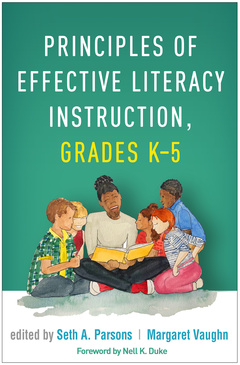Description
Principles of Effective Literacy Instruction, Grades K-5
Coordinators: Parsons Seth A., Vaughn Margaret
Language: English
Subject for Principles of Effective Literacy Instruction, Grades K-5:
Publication date: 05-2021
· 15.2x22.9 cm · Hardback
Publication date: 06-2021
· 15.2x22.9 cm · Paperback
Description
/li>Contents
/li>Readership
/li>Biography
/li>
What are the principles that every elementary teacher must learn in order to plan and adapt successful literacy instruction? This concise course text and practitioner resource brings together leading experts to explain the guiding ideas that underlie effective instructional practice. Each chapter reviews one or more key principles and highlights ways to apply them flexibly in diverse classrooms and across grade levels and content areas. Chapters cover core instructional topics (phonemic awareness, phonics, fluency, vocabulary, and comprehension); high-quality learning environments; major issues such as assessment, differentiation, explicit instruction, equity, and culturally relevant pedagogy; and the importance of teachers? reflective practice and lifelong learning.
I. Environment
1. Print- and Text-Rich Classroom Environments, Allison Ward Parsons & Christy Irish
2. Well-Managed and Efficient Literacy Learning Environments, D. Ray Reutzel & Sarah K. Clark
3. Literacy Teaching for Equity, María Paula Ghiso, H. Gerald Campano, & Ankhi G. Thakurta
II. Instruction
4. Phonemic Awareness and Phonics, Evan Ortlieb, Susan Schatz, & Kathy Ganske
5. Reading Fluency, Chase Young, Timothy Rasinski, & Shelly Landreth
6. Comprehension and Vocabulary, Douglas Fisher, Nancy Frey, & Rachelle S. Savitz
7. Assessment, Dixie Massey
8. Appropriate Intervention, Ying Guo & Allison Breit-Smith
9. Effective Differentiation, Steven J. Amendum & Kristin Conradi Smith
10. Explicit Instruction, Dana A. Robertson
11. Using Discussion to Support Literacy Learning, Jacquelynn A. Malloy & Leslie D. Roberts
12. Writing–Reading Integration, Zoi A. Philippakos
13. Literacy in the Disciplines, Cynthia H. Brock, Vicky I. Zygouris-Coe, Andrea Hayden, Joshua Montgomery, Kathleen Kniss, & Katherine Muir Welsh
14. Arranging for Reading Engagement, Gay Ivey & Erika S. Gray
15. Authentic, Challenging Tasks, Roya Q. Scales
16. Autonomy-Supportive Classroom Environments, Samantha T. Ives, Madelyn Stephens Wells, & Seth A. Parsons
17. Culturally Relevant Pedagogy and Multiliteracies, Jennifer D. Turner, Chrystine Mitchell, & Olivia A. Murphy
18. Critical Approaches to Text, Grace Enriquez
19. Integrating Digital Technology, Amy C. Hutchison
20. Adaptive Teaching, Margaret Vaughn
III. Teachers
21. Reflective Practice, Mary McGriff & Michelle Rosen
22. Teachers as Lifelong Learners, Aimee L. Morewood & Julie W. Ankrum
Index
Seth A. Parsons, PhD, is Professor in the Sturtevant Center for Literacy in the School of Education at George Mason University. He teaches in the Elementary Education, Literacy, and Research Methods program areas. His award-winning research focuses on student motivation and engagement, teacher instructional adaptations, and teacher education and development. Dr. Parsons is currently coeditor of the Journal of Literacy Research and is past president of the Association of Literacy Educators and Researchers. He is coeditor of Principles of Effective Literacy Instruction, Grades K-5, and coauthor of Accelerating Learning Recovery for All Students.
Margaret Vaughn, PhD, is Professor in the Department of Teaching and Learning at Washington State University. She teaches in the program areas of Research and Literacy, Language, and Technology. As a former classroom teacher, Dr. Vaughn recognizes the valuable role of teacher input and decision making in policy and practice and supports efforts to develop equity-focused learning environments. She is an advocate for student agency and developing equitable schools across the nation. Her award-winning research addresses issues of teacher practice and contemporary educational issues. Dr. Vaughn is coeditor of Principles of Effective Literacy Instruction, Grades K-5, and coauthor of Accelerating Learning Recovery for All Students and Teaching with Children’s Literature.




